
Inside
|
Of wars and generals Renowned Daily Star columnist Megasthanes returns with a penetrating and provocative analysis of the military mind When John Foster Dulles died of cancer in May of 1959, President Eisenhower -- whose secretary of state he was for over six years -- paid him a moving tribute. In a statement, Ike said that a lifetime of labour for peace had ended. Dulles had not been Eisenhower's first choice for the State Department. The top cabinet job was in fact offered to Tom Dewey, then governor of New York, who had twice unsuccessfully run for president as the Republican candidate. It was only after Dewey declined, and warmly recommended Dulles, that Ike chose him.
As was once observed, every generation tends to look back to its predecessors and imagine a world in which stern reality gives way to romantic imagination. All too often, the past, seen through the prism of intervening years, appears in too roseate a hue. Americans of a certain age or generation -- and with reason enough I should think -- tend to look back upon the Eisenhower presidency with affection and more than a tinge of nostalgia as the halcyon years of the post-World War II era. Ike's own standing with historians and experts has gone up steadily with the passing of the years, as more and more State papers are declassified, studied, and, possibly, also reappraised. Dulles' reputation, on the contrary, has, if anything, plummeted, even with Americans. In 1981, the results of a poll of 50 diplomatic historians in the US placed him in the category of 5 of the worst secretaries of state. If at all people think of him today, it is as the progenitor and proponent of such bizarre doctrines as "brinkmanship" and "massive nuclear retaliation." Indeed Dulles' many sterling qualities were offset by certain less than endearing traits. Of gaunt and almost ascetic appearance, he was a sternly pious and moralistic son of the Manse, living in a Manichaean world of black and white, without any shades of grey. His refusal to shake Chou-en Lai's proffered hand at the 1954 Geneva Conference on Indo-China was a wholly gratuitous insult that surely did not enhance the prospects or cause of world peace. Nearly two decades on, it took Henry Kissinger -- and also President Nixon -- to make amends for this graceless act. Dulles was not even averse to cosying up to venal and unscrupulous dictators, provided, of course, they were sufficiently anti-communist. Communism for him was a monolithic menace, an evil to be combated at all costs. Neutrality on this issue was fence-sitting and, thus, immoral. Sir Feroz Khan Noon, in his memoirs I think, described Dulles as a great friend of Pakistan. Sir Feroz should certainly know. And yet, one cannot but wonder whether Dulles' feelings or sentiments in respect of Pakistan had to do with the land or its people, or with the role he perceived for that country as the most trusted US ally Baghdad Pact/Cento and Seato -- in the region, and as a bulwark against communism. This somewhat lengthy preamble or digression should make it clear that I am not exactly an unqualified admirer of Dulles. And yet I would wholeheartedly subscribe to something that he once said or wrote. Apropos of what, I do not quite recall, Dulles observed that: "The world will never have lasting peace so long as men reserve for war the finest human qualities."
The military represents, in essence, organised power that is so essential for governing a state or running a government, and generals personify the highest echelons of the military. It is no coincidence that in times past, military and political powers were fused or merged in the same authority, and that successful kings or rulers were more often than not competent generals as well. The examples of Alexander, Caesar, Taimur, Duke William, Harsha, and Sultan Mahmud come readily to mind. In Britain, even today, the monarch -- or in the present case the Royal Consort -- is a simultaneously vested with the highest ranks of all three services, namely, Admiral of the Fleet, Field Marshal, and Marshal of the RAF. In the US, it is the president who is the Commander-in-Chief of the Armed Forces, and two of France's greatest heroes, or even idols, are Napoleon and de Gaulle -- both of whom wielded full political authority and were also authentic military leaders. War heroes have a special niche in every country. Marlborough, in Britain, for much of his career wielded enormous influence, if not formal authority or power. In Britain in particular, military leaders were traditionally well-rewarded -- munificent gifts of land, handsome purses, titles, and honours. Wellington possibly is the only example of a British professional soldier and war hero --who incidentally cut his military teeth in British India -- who also achieved the highest political office. Instances of civil-military undercurrents, if not tension, were not exactly unheard of even when civilian primacy over the military became the norm in established democracies. In British India, the most imperious and imperial of viceroys, Lord Curzon, clashed with his own hand-picked commander-in-chief, Kitchener. Ultimately, when the British cabinet upheld Kitchener, Curzon resigned. He went on to occupy other high political offices, but the ultimate prize, the prime ministership, eluded him. Kitchener himself, though disappointed at not being named viceroy, was later appointed to the British War Cabinet during World War I. The appointment did not quite facilitate liaison between the civil and military powers, presumably the main purpose for which it was made. Kitchener quarreled "endlessly with 23 gentlemen" in the cabinet, and when he drowned at sea after his ship was struck by a mine, I wonder if he was deeply or genuinely mourned. He could not have been, by all accounts, a very amiable or companionable individual. We have it on the authority of Churchill himself that, in Sudan, Kitchener had the body of the slain Mahdi disinterred and cut to pieces. Was this simply to cow the local population into servility? Or was it to quench some atavistic and savage craving in the man? Sir William Robertson -- who also saw service in British India and who belonged to a rare breed, a soldier who rose from enlisted ranks to Field Marshal -- was the Chief of the Imperial General Staff (CIGS) for the greater part of World War I. He differed strenuously with his War Minister, Lloyd George, as did Field Marshal Haig. Today the world "Imperial" has been dropped from the title, and the holder of the office is known more modestly as Chief of General Staff or CGS. By the time of World War II, circumstances had clearly evolved to the advantage of the civilian and political leadership. Churchill personally retained the defence portfolio, and there was no scope for any doubt as to who was the boss. He went through three Chiefs of the Imperial General Staff in succession before he settled on Field Marshal Alan Brooke for the job. Field Marshals Gort, Ironside, and Sir John Dill were all tried and got short shrift -- although all were in their distinct ways outstanding professional soldiers. Altogether 10 officers made it to the rarefied rank of Field Marshal during, or just following, World War II. The others were Maitland Wilson, Alexander, Montgomery, Auchinleck, Wavell, and Slim. Alexander was the favourite British general of the Americans. He went on to become governor general of Canada, and then defence minister of the UK. Montgomery became CIGS after the war and then moved on to NATO as Ike's deputy. Slim also became CIGS, and later governor general of Australia. Wavell was the last but one viceroy of India. Montgomery and Slim are generally thought to have been the two finest field commanders of the ten, although Wavell, Alexander, and Auchinleck also have their share of admirers. In the late 1970s, or perhaps 1980, ten plaques were placed in St. Paul's Cathedral in London to honour the ten field marshals. Only Auchinleck was then still alive, but settled in Morocco. He was too old, and possibly too infirm, to travel to London for the ceremony. The UK remains one of the few countries where the five stars, or highest military rank, are still given, even in peace-time. It is interesting to note that the notion of civilian supremacy notwithstanding, a few military leaders in British India did hold the highest civilian office of viceroy. I am not aware that any officer of the heaven born ICS ever held the office. I have never quite grasped the French system of promotion to marshal -- as the 5 star rank is known in France. A French friend did once try to explain the process and, from what I recall, some fairly exacting conditions have to be met for this purpose. In World War I, the four eminent marshals of the French army were Joffre, Lyautey, Petain and Foch. Foch and Joffre are still remembered as authentic war heroes. Petain certainly would have been in that select company but for the fact that he lived on for about 15 years too long. In another sense, of course, nothing should detract from Petain's accomplishments or triumphs in World War I. There is a body of opinion, howsoever small or muted, that is firmly of the view that even in World War II Petain was the shield to de Gaulle's sword, that he simply did what he believed he had to do to secure the French from indignities beyond what had already been inflicted. The most imposing avenue to radiate from the Place de L'Etoile in Paris, next only to the Champs Elysees is named after Foch, who is buried, if I recall correctly, at the Invalides with other military heroes round Napoleon's tomb. From the war front at the second battle of the Marne, Foch had sent to his then superior Joffre, the dispatch which possibly best epitomises the distilled courage, buccaneer definance, and indomitable spirit of a true soldier in adversity: "My centre is giving way, my right is pushed back, situation excellent, I am attacking." Joffre's own reputation and lustre were irretrievably tarnished by the failure of his tactics at the Somme. In World War II, the French army's was more of a supportive role, and it may have been difficult to meet the rigorous criteria for preferment to the rank of marshal. Generals Leclerc and, later, de Lattre de Tassigny were, nevertheless, elevated, but posthumously. General de Gaulle's own role in World War II was more political than military. In grasp of strategy, or in terms of military ability, however, he could, in the view of most experts, hold his own in any company. The US army, relative to the British and the French, is short on tradition. In World War I, the Commander of the American Expeditionary Force, Pershing (West point 1896), was given the special rank of General of the Armies; at least in part to enable him to parley on equal terms with the Marshals of France and Field Marshals of Britain. No one else, before or since, has been conferred that particular rank or title. Subsequently Pershing served as Chief of Staff of the US. Army. In World war II, a similar problem arose, and more so since the US, after Pearl Harbour, bore the major brunt of the fighting, among the Western powers. Four generals were conferred the 5 star rank -- with the formal title of General of the Army -- MacArthur, Marshall, Eisenhower, and Bradley. There was also another 5 star general, Hap Arnold (West Point 1907), who, however, would more appropriately fall in the category of Air Force General. MacArthur had topped the class of 1903 at West Point. He is also possibly the only topper -- or one of a very few -- to make it to the pinnacle of his profession. He was, and possibly still remains, the youngest person to be appointed US Chief of Army Staff. Marshall graduated not from West Point but from the Virginia Military Institute -- in 1901. Though the same age as MacArthur -- both were born in 1880 -- he was a mere colonel when MacArthur had completed his extended term as Chief of Army Staff in 1935. Marshall got his first star only in 1936, and from then on moved swiftly up the ladder to eventually become chief of staff -- an office he held throughout World War II. After retirement he served both as Truman's secretary of state, and then as secretary of defence. He also won the ultimate accolade -- the Nobel Prize for Peace -- the only professional soldier to do so to my knowledge. He was, thus, truly first in war and also in peace. Ike graduated from West Point in 1915, and was placed 61 out of a class of 168. Bradley -- though about 3 years younger -- graduated in the same year from West Point. He was placed 44, or 17 places ahead of Ike. The West Point class of 1915, because of World War II, was the "class that the stars fell on." 59 of them became general officers. Two of them, as mentioned, wore 5 stars; there were also two 4 star or full generals, and seven 3 star or lieutenant generals. In the year-book of that class, Eisenhower wrote of Bradley in glowing terms. "Some of us will some day," Ike wrote, "be bragging to our grandchildren that 'sure General Bradley was a classmate of mine.'
Ike, of course, attained even greater heights, although he was, according to many, more of a political general. It was never suggested that he was a military genius (though he was), but he was thought to possess the necessary command personality for a multi-national force. In a sense, he superseded Bradley to become Supreme Commander of the Allied Expeditionary Forces in Europe, and succeeded Marshall as chief of army staff after the war. After retirement, he was successively President of Columbia University, the first Supreme Commander of Nato and, ultimately, twice elected president of the United States. MacArthur never made it to the White House, though he did have political ambitions. Recalled from retirement to active duty after the attack on Pearl harbour, he was the Supreme Allied Commander in the South-West Pacific theatre of the war. He accepted the surrender of Japan and, after the war, wielded near absolute political authority over that country. He proved to be an able and even liberal administrator. He is also an authentic hero in another country, the Philippines. Bradley has described him as "awesomely brilliant," but also a megalomaniac, in which category he also placed Field Marshal Montgomery and General Patton (West Point 1909).
Truman was not particularly enthused about his successor in office, General Eisenhower, either. One general whom Truman did hold in the highest esteem was General Marshall. Bradley, in his autobiography, states that in the waning days of his presidency, Truman once said to him that if he had known him better and earlier, he (Truman) would have pushed him (Bradley) for president. Civilian supremacy over the military is taken for granted in the US. And yet there are nuances. The uniform does command great esteem and respect. Six of America's 41 presidents have been professional soldiers. Five others were nominated for president. Around 35 other presidential or vice-presidential candidates served in the military in some capacity or other. In 1996, opinion polls persistently showed General Colin Powell as the strongest possible contender to oppose the incumbent president. The war record of a candidate -- whether for president, governor or for Congress -- can and has been parlayed into political advantage.President Kennedy's war-time heroism was assuredly an asset, while President Clinton's military record, or lack of it, was almost the opposite in 1992. Dr. Kissinger in his "White House Years" recounts an interesting anecdote that touches upon the nuances of civil-military relations and the clout of the uniform. In the early 60s, he was sent by President Kennedy to broach some new strategic doctrine or arrangement with the then German Chancellor, Adenauer. Kissinger, the expatriate German who had made good, was naturally at his effusive best when briefing the Grand Old Man of Germany. The latter listened impassively until, at one point, he interrupted to inquire mildly as to who had briefed Kissinger. On receiving the answer -- the name of a well-known general -- Adenauer asked, almost as a non-sequitur, whether the general had been in uniform during the briefing. Thoroughly nonplussed, Kissinger confessed that he did not remember. Adenauer promptly dismissed Kissinger with some sage advice -- to get the same briefing from the same general, but to make sure that he was in civilian clothes and not in uniform. If Kissinger, after the briefing by the general in civilian clothes, still found the doctrine convincing, he, Adenauer, would be happy to listen to him seriously.
General of the Army, Bradley, in his memoirs, was emphatic that a general should never aspire to the presidency. I do not know if a similar inhibition weighed down General Colin Powell -- his successor several times removed as Chairman of the Joint Chiefs of Staff -- who declined to run for president in 1996, notwithstanding that successive polls showed him to be easily the strongest Republican candidate. An American friend attributed Powell's reluctance to Mrs. Powell's distaste for the hustings and, perhaps, also a shrewd assessment that one could not realistically hope to be the first black president of the US without the wholehearted endorsement of the major black organisations. Generals, more than any other breed or category of people, are primed for, and are often the products of, war. With very few exceptions -- like possibly Patton -- they are not as a class "war lovers" because, again more than any other class of people, they know what war is about. General Sherman (West Point, 1840), next only to Grant (West Point 1843) in fame and renown among the Union generals during the US Civil War, characterised war at different times very succinctly and aptly as "cruelty" that cannot be "refined," as "at best barbarism," its glory being "all moonshine," and as "hell." Generals assuredly need to be professional and realistic, ready for whatever task they may be called upon to do. For as General Marshall put it so wryly in his Biennial Report to the US Congress as Chief of Army Staff in 1945: "If man does find the solution for world peace, it will be the most revolutionary reversal of his record we have ever known."
Is there then to be no answer to the threat of war? US philosopher William James, writing in 1902, offered a plausible if abstract prescription which almost anticipates the preamble of Unesco and supplements Dulles' observation to which referred earlier. James wrote: "What we need to discover in the social realm is the moral equivalent of war: Something heroic that will speak to men as universally as war does, and yet will be as compatible with their spiritual selves as war has proved itself to be incompatible." Megasthenes is an eminent Bangladeshi columnist.
|
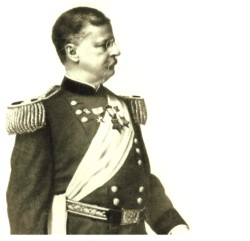 Dulles certainly possessed unimpeachable credentials for State. Very few of his more than 50 predecessors -- or for that matter his successors -- could have come to Foggy Bottom better equipped or primed for the job. Educated at the elite institutions of Princeton University and the Sorbonne, trained in the law, suave and sophisticated and elegant he had been associated, when all of 30 years of age, as legal counsel at the Versailles Peace Conference. He assisted in the preparation of the UN Charter at Dumbarton Oaks, and was senior adviser at the San Francisco Conference. He also negotiated the peace treaty with Japan. Coincidentally enough, he was the grandson of a secretary of state and it was his life's ambition to achieve that office, which he did at the age of 64.
Dulles certainly possessed unimpeachable credentials for State. Very few of his more than 50 predecessors -- or for that matter his successors -- could have come to Foggy Bottom better equipped or primed for the job. Educated at the elite institutions of Princeton University and the Sorbonne, trained in the law, suave and sophisticated and elegant he had been associated, when all of 30 years of age, as legal counsel at the Versailles Peace Conference. He assisted in the preparation of the UN Charter at Dumbarton Oaks, and was senior adviser at the San Francisco Conference. He also negotiated the peace treaty with Japan. Coincidentally enough, he was the grandson of a secretary of state and it was his life's ambition to achieve that office, which he did at the age of 64.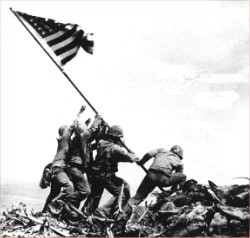 He never spoke truer words.
He never spoke truer words.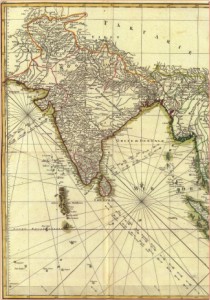 Bradley, who in World War II served as one of Eisenhower's field commanders, later succeeded him as chief of army staff, and became the first chairman of the joint chiefs of staff when the post was created. Eisenhower considered him as "America's foremost battle leader."
Bradley, who in World War II served as one of Eisenhower's field commanders, later succeeded him as chief of army staff, and became the first chairman of the joint chiefs of staff when the post was created. Eisenhower considered him as "America's foremost battle leader."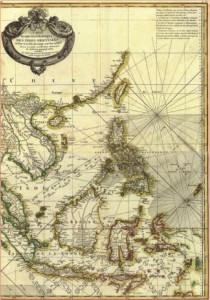 MacArthur's military career, spanning nearly 5 decades, ended in controversy when he was unceremoniously removed from the command of the UN forces in Korea by Truman. It is difficult not to uphold Truman in this decision. The issue was, as Truman put it, civilian supremacy over the military. He was never one to mince his words. Speaking to Merle Miller, as quoted in the latter's book "Plain Speaking," years after the event, Truman said: "I fired him because he wouldn't respect the authority of the president. I didn't fire him because he was a dumb son of a bitch, although he was, but that's not against the law."
MacArthur's military career, spanning nearly 5 decades, ended in controversy when he was unceremoniously removed from the command of the UN forces in Korea by Truman. It is difficult not to uphold Truman in this decision. The issue was, as Truman put it, civilian supremacy over the military. He was never one to mince his words. Speaking to Merle Miller, as quoted in the latter's book "Plain Speaking," years after the event, Truman said: "I fired him because he wouldn't respect the authority of the president. I didn't fire him because he was a dumb son of a bitch, although he was, but that's not against the law."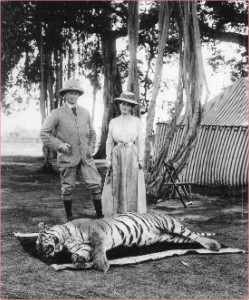 A very insightful perspective of civil-military relations in the US is afforded in Manchester's "Death of a President." McNamara, then secretary of defence, and under the president the civilian boss of the entire US military establishment, had gone to Arlington Cemetery to see the grave site of the slain president, John Kennedy, before the funeral ceremonies, when it began to rain heavily. With the defence secretary were two other cabinet officers, Interior Secretary Udall and Attorney General Robert Kennedy. Standing in pouring rain for over an hour, without raincoat or protective gear, McNamara was quite drenched. The military brass present were "buttoned up in foul-weather gear and never thought to share their protection with the civilians." McNamara, reportedly, was not surprised that not one of his subordinates among the military offered him his own oilskin. The man in uniform in the US defers to only one civilian, his Commander-in-Chief, the President of the United States!
A very insightful perspective of civil-military relations in the US is afforded in Manchester's "Death of a President." McNamara, then secretary of defence, and under the president the civilian boss of the entire US military establishment, had gone to Arlington Cemetery to see the grave site of the slain president, John Kennedy, before the funeral ceremonies, when it began to rain heavily. With the defence secretary were two other cabinet officers, Interior Secretary Udall and Attorney General Robert Kennedy. Standing in pouring rain for over an hour, without raincoat or protective gear, McNamara was quite drenched. The military brass present were "buttoned up in foul-weather gear and never thought to share their protection with the civilians." McNamara, reportedly, was not surprised that not one of his subordinates among the military offered him his own oilskin. The man in uniform in the US defers to only one civilian, his Commander-in-Chief, the President of the United States!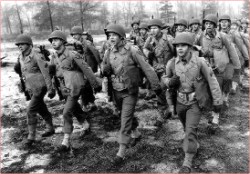 In 1945, Unesco was set up, as its preamble puts it, to construct the defences of peace in the minds of men. It has had only limited and unspectacular success. Former UN Secretary General Dr. Boutros Boutros-Ghali in his seminal report, Agenda for Peace, wrote in 1992 that since 1945 there had been over 100 major conflicts around the world resulting in over 20 million deaths. In the intervening years since the report was written, these numbers could only have increased. Lester Pearson, the Nobel Laureate for Peace, once made the startling, or not so startling, admission that men liked war: "We like the excitement of it, its thrill and glamour, its freedom from restraint … And we like taking chances with death." Another Nobel Laureate -- for literature -- and also a pacifist and philosopher, Bertrand Russell wrote in 1967 of having discovered to his amazement that "average men and women were delighted at the prospect of war."
In 1945, Unesco was set up, as its preamble puts it, to construct the defences of peace in the minds of men. It has had only limited and unspectacular success. Former UN Secretary General Dr. Boutros Boutros-Ghali in his seminal report, Agenda for Peace, wrote in 1992 that since 1945 there had been over 100 major conflicts around the world resulting in over 20 million deaths. In the intervening years since the report was written, these numbers could only have increased. Lester Pearson, the Nobel Laureate for Peace, once made the startling, or not so startling, admission that men liked war: "We like the excitement of it, its thrill and glamour, its freedom from restraint … And we like taking chances with death." Another Nobel Laureate -- for literature -- and also a pacifist and philosopher, Bertrand Russell wrote in 1967 of having discovered to his amazement that "average men and women were delighted at the prospect of war."